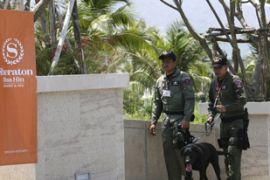Asean under pressure over rights
Human rights groups fear economic woes will force human rights off summit agenda.

New York–based Human Rights Watch (HRW) said recent experience, particularly in the group’s approach to Myanmar – itself an Asean member – had shown “glaring failures”.
“Burma’s military government continues to deny its citizens basic freedoms, including freedom of expression, association and assembly,” the group said in a statement, referring to Myanmar by its former name.
‘Need for action’
| Asean | ||
|
Amnesty International also urged action on rights, pointing in particular to recent allegations of abuse by the Myanmar and Thai militaries against stateless Rohingya migrants from western Myanmar.
“The treatment of the Rohingya boat people has highlighted the urgent need for regional action on human rights,” Donna Guest, the deputy director of Amnesty International’s Asia-Pacific unit, said in a statement.
“Asean must act now to address human rights concerns in Southeast Asia, many of which are having a negative impact regionally and even globally.”
Human rights groups have accused the Thai army of conducting a systematic campaign of abuse against the Rohingya, including towing boatloads of migrants who had washed up on Thailand’s shores back out to sea in rickety boats with little food or water.
Many were rescued in Indonesian and Indian waters, but rights groups fear that scores have died.
Myanmar, governed by the military since 1962, has long been a controversial member of Asean, with Western countries urging the group to push the country towards political reform.
 |
| International outrage has been growing over the treatment of Rohingya migrants [Reuters] |
On Wedneday an annual human rights report released by the US state department accused Myanmar’s ruling military of “brutally” suppressing its citizens and razing entire villages.
Friday’s meeting is the first gathering of regional leaders since the group signed a landmark charter in December.
That document made Asean a legal entity and moves it a step closer toward the goal of establishing a single market by 2015 and becoming a regional communinty along similar lines to the European Union.
But the run-up to the summit has showcased some of the disarray of Asean, which groups more than 500 million people and includes a wide-range of political systems including fledgling democracies, a monarchy, a military government and two communist governments.
‘Waste of time’
Originally scheduled for December in Bangkok, the summit was postponed because of political unrest in Thailand.
Abhisit Vejjajiva, the Thai prime minister, who came to power that month on the back of the unrest, shifted the venue from the Thai capital to escape lingering protests.
Ahead of Friday’s summit, thousands of Thai security forces have been deployed around the resort of Hua Hin, as anti-government protesters keep up a vigil outside the seat of government in Bangkok.
Hun Sen, the Cambodian prime minister has said the summit will be “a waste of time,” since China, Japan and South Korea are unable to attend.
Their absence means that Asean leaders cannot lobby Asia’s big economic powers for financial aid.
South-East Asian countries are struggling to revive their export-driven economies amid rising unemployment and fears of recession, linked to the global economic crisis.

 Regional grouping founded in 1967 by Indonesia, Malaysia, the Philippines, Singapore, and Thailand
Regional grouping founded in 1967 by Indonesia, Malaysia, the Philippines, Singapore, and Thailand